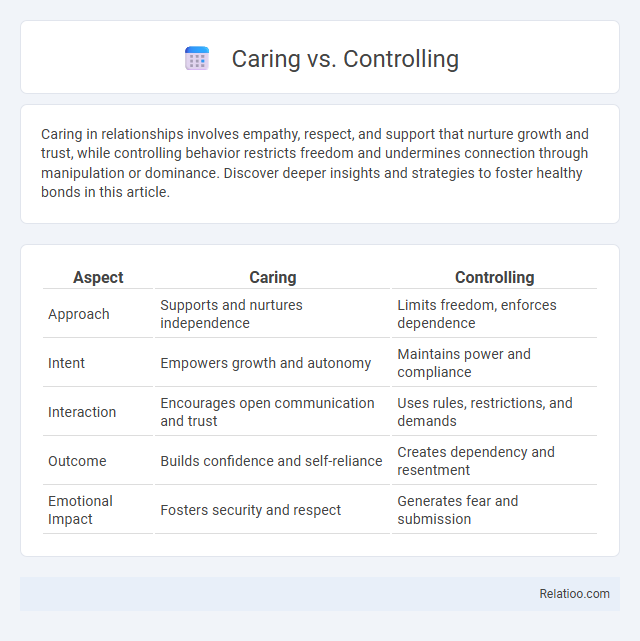Caring in relationships involves empathy, respect, and support that nurture growth and trust, while controlling behavior restricts freedom and undermines connection through manipulation or dominance. Discover deeper insights and strategies to foster healthy bonds in this article.
Table of Comparison
| Aspect | Caring | Controlling |
|---|---|---|
| Approach | Supports and nurtures independence | Limits freedom, enforces dependence |
| Intent | Empowers growth and autonomy | Maintains power and compliance |
| Interaction | Encourages open communication and trust | Uses rules, restrictions, and demands |
| Outcome | Builds confidence and self-reliance | Creates dependency and resentment |
| Emotional Impact | Fosters security and respect | Generates fear and submission |
Understanding the Difference: Caring vs Controlling
Understanding the difference between caring and controlling is essential for healthy relationships and personal boundaries. Caring involves empathy, support, and respect for your autonomy, while controlling behaviors aim to dominate or limit your choices and freedom. Recognizing these distinctions helps you foster trust and mutual respect rather than dependence or resentment.
The Psychology Behind Caring Actions
Caring involves empathetic support that promotes autonomy and well-being, fostering positive psychological development. Controlling behaviors undermine Your sense of independence by imposing external rules and pressure, often leading to increased stress and decreased motivation. Overinvolvement blurs boundaries, causing emotional exhaustion and reducing the effectiveness of care by fostering dependency rather than resilience.
Signs You’re Being Caring, Not Controlling
Signs you're being caring, not controlling include respecting Your loved one's autonomy and offering support without imposing decisions or monitoring their every move. Encouraging open communication and trusting their judgment demonstrates care rather than control. Genuine concern focuses on empowerment and well-being, avoiding micromanagement or pressure.
When Caring Turns Into Control
When caring shifts into control, your intentions may unintentionally limit personal freedom and foster dependency. Controlling behavior often masks anxiety, creating a dynamic where approval feels conditional and autonomy is compromised. Recognizing the fine line between supportive care and overinvolvement helps maintain healthy boundaries and promotes individual growth.
The Impact of Controlling Behaviors on Relationships
Controlling behaviors in relationships often lead to decreased trust and emotional distance, undermining the foundation of healthy communication. Your partner may feel suffocated and powerless, which increases resentment and conflict over time. Recognizing the difference between caring and controlling is essential for fostering mutual respect and emotional support.
Healthy Boundaries: Key to Balanced Care
Healthy boundaries distinguish caring from controlling and overinvolvement by respecting personal autonomy and emotional space, essential for balanced care. You foster trust and mutual respect by allowing others to make their own decisions while offering support without micromanaging. Maintaining clear limits prevents burnout and promotes healthy relationships rooted in empathy rather than dependency or domination.
Empowering Others Through Genuine Care
Empowering others through genuine care involves fostering trust and respect instead of exerting control or becoming overinvolved, which can stifle autonomy and growth. Your ability to balance support with encouragement allows individuals to develop confidence and make independent decisions. Prioritizing empathetic listening and offering guidance without micromanaging strengthens relationships and promotes lasting empowerment.
Red Flags of Controlling Dynamics
Controlling dynamics in relationships often manifest through excessive monitoring, restricting personal freedoms, and imposing decisions, signaling red flags such as lack of trust and respect. Persistent attempts to dominate a partner's choices or isolate them from support networks indicate an unhealthy power imbalance. Recognizing these controlling behaviors early is crucial for maintaining autonomy and emotional well-being.
Transforming Controlling Habits into Caring Ones
Transforming controlling habits into caring ones involves recognizing the difference between exerting power and offering genuine support, which helps build trust and respect in relationships. You can shift from control to care by practicing active listening, setting healthy boundaries, and encouraging autonomy rather than imposing restrictions. Fostering empathy and patience enables you to create a nurturing environment where care replaces overinvolvement and control, promoting emotional well-being and mutual growth.
Fostering Mutual Respect in Relationships
Fostering mutual respect in relationships requires balancing caring without slipping into controlling or overinvolvement behaviors that can undermine trust and autonomy. You can promote healthy connections by expressing empathy and support while allowing space for individual growth and decision-making. Prioritizing open communication and recognizing each partner's boundaries strengthens respect and collaboration.

Infographic: Caring vs Controlling
 relatioo.com
relatioo.com